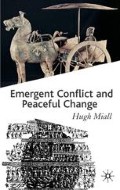Abstract
A harsh wind was blowing over the uplands, down from the snow-clad mountains. Change was on the way. The old dictator had fallen. The people had torn down the bridges, the irrigation works, the factories and collective farms. They destroyed everything that remained as a symbol of the hated past. Now it was time to rebuild. But the land would not sustain everyone who lived on it. There were too many people living on too small plots. Subsidies from the government were no longer coming. Something would have to change.
Access this chapter
Tax calculation will be finalised at checkout
Purchases are for personal use only
Preview
Unable to display preview. Download preview PDF.
Notes
David Watson (ed.) The Albanians of Rrogam, consulting anthropologist Berit Backer, video, Granada: Disappearing World, 1992;
see also Ali Eminov, Film Review, American Anthropologist, New Series, vol. 95, No. 2, June 1993, 515–17.
aaa Thucydides, History of the Peloponnesian War, trans. Rex Warner, Harmondsworth: Penguin, 1954, p. 49.
A.J.P. Taylor, ‘How War Begins — (4) The First World War’, BBC1, 1 August 1977, quoted in Suganami (1996: 159–60).
Karl Marx, Contribution to the Critique of Political Economy, 20–1 (quoted by Boucher 1998: 364).
Author information
Authors and Affiliations
Copyright information
© 2007 Hugh Miall
About this chapter
Cite this chapter
Miall, H. (2007). Introduction. In: Emergent Conflict and Peaceful Change. Palgrave Macmillan, London. https://doi.org/10.1057/9780230288492_1
Download citation
DOI: https://doi.org/10.1057/9780230288492_1
Publisher Name: Palgrave Macmillan, London
Print ISBN: 978-0-333-98767-4
Online ISBN: 978-0-230-28849-2
eBook Packages: Palgrave Political & Intern. Studies CollectionPolitical Science and International Studies (R0)

